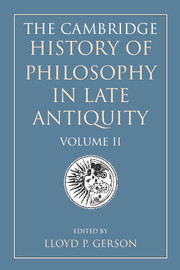Book contents
- Frontmatter
- VI Late Platonism
- Introduction to Part VI
- 32 From Constantine to Justinian
- 33 Plutarch of Athens
- 34 Syrianus
- 35 Proclus
- 36 Ammonius Hermeiou and his school
- 37 Damascius
- 38 Olympiodorus
- 39 Simplicius of Cilicia
- 40 John Philoponus
- 41 Priscian of Lydia and Pseudo-Simplicius on the soul
- VII The third encounter of Christianity with ancient Greek philosophy
- VIII Philosophy in transition
- Appendix: List of works of ancient authors
- List of abbreviations
- Bibliography
- Index locorum
- General index
- References
39 - Simplicius of Cilicia
from VI - Late Platonism
Published online by Cambridge University Press: 28 May 2011
- Frontmatter
- VI Late Platonism
- Introduction to Part VI
- 32 From Constantine to Justinian
- 33 Plutarch of Athens
- 34 Syrianus
- 35 Proclus
- 36 Ammonius Hermeiou and his school
- 37 Damascius
- 38 Olympiodorus
- 39 Simplicius of Cilicia
- 40 John Philoponus
- 41 Priscian of Lydia and Pseudo-Simplicius on the soul
- VII The third encounter of Christianity with ancient Greek philosophy
- VIII Philosophy in transition
- Appendix: List of works of ancient authors
- List of abbreviations
- Bibliography
- Index locorum
- General index
- References
Summary
LIFE
The few facts we have about Simplicius’ life come from his own works and a few other sources. He came from Cilicia (south-eastern Anatolia) as Agathias tells us (Hist. 2.30). He was educated by Ammonius in Alexandria (fl. 490 ce, cf. In Cael 26.18–19) and Damascius (fl. 520 ce) in Athens (In phys. 601.19). Among influential figures on his philosophical outlook are Porphyry, the learned pupil and biographer of Plotinus (245–320), Iamblichus (fl. 300 ce, referred to as ‘the divine Iamblichus’, In phys. 60.7; 639.23 etc.), and Proclus (‘the teacher of my teachers’, In phys. 611.11–12, cf. 795.4–5). The expulsion of Platonists from Athens in 532 ce after Justinian’s ban on pagan teaching ended school activities in 529 ce (Malalas Chronicle 18.47), the cross-references between the extant works, and the lack of evidence after 540 ce suggests that his life-span comes roughly to 480–560 ce. Allusive comments in a discussion of the role of the philosopher in the city in his commentary on Epictetus (In Epict. 32.65.30– 9 D. with reference to Plato Rep. 496d) make it probable that he wrote that commentary before the others while still in Athens, as does his mention of the oppressive situation in Athens (ibid. epilogue). His personal note on friendship (In Epict. 87.39–44/354 Hadot) indicates that he experienced help from friends who looked after his family while he was away, but we cannot establish the nature and date of this event.
- Type
- Chapter
- Information
- The Cambridge History of Philosophy in Late Antiquity , pp. 711 - 732Publisher: Cambridge University PressPrint publication year: 2000



